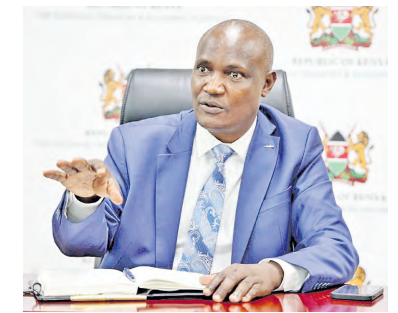
The government will be saving up to Sh60 billion from the state corporations’ reforms plan announced on Tuesday, the Treasury has said.
The savings will largely be in operational costs and cutting back on the government subsidies occasionally injected to prop up the unprofitable entities.
National Treasury CS John Mbadi told the Star the streamlining of the state entities will save taxpayers billions currently pumped into the institution, majority with minimal returns.
Treasury estimated the merger plans could save taxpayers’ at least Sh60 billion annually.
“From the preliminaries it would be about Sh60 billion, in terms of operational costs. We have not come up with a final figure...but it will be significant,” Mbadi told the Star on the phone.
With Sh60 billion, the government can comfortably do two ‘Thika Superhighways’ kind of road projects, complete with eight-lane road and four-service lanes.
Thika road was done at Sh32 billion. The amount if given to the Teachers Service Commission can hire 100,000 teachers on permanent and pensionable going by the budget presented by the commission to Parliament.
The Treasury boss termed the move long overdue and vowed to ensure its full implementation.
“We will embark on the process, we will organise even steering committee because we have to implement this. This has been a song for far too long,” Mbadi said.
The CS assured that no employee would be dismissed in the process instead they will be redeployed to areas with critical shortages within the public service.
“The staff will be absorbed elsewhere in the national government,” Mbadi assured.
Most of the entities earmarked for scrapping have turned themselves into salary payment platforms for board members and employees with reports showing that despite substantial government funding, they were bring nothing in return.
In fact, several of them are in the red, surviving solely on taxpayers support.
Auditor General Nancy Gathungu in a string of reports has raised alarm that the number of state-owned enterprises in financial distress seems to grow by the day.
For instance, the Kenya Fish Marketing Authority was established eight years ago yet it has not carried out any of its mandates because it has no employee of its own.
Interestingly, the agency has 13 board members, whose perks in the last financial year amounted to Sh10 million, out of the Sh51 million allocations.
KFMA is among state corporations recommended for dissolution in Ruto’s brutal purge. In a radical policy shift, the Cabinet sitting in Kakamega recommended a raft of changes that will see most of the non-profit entities scrapped.
According to the plan, 42 state corporations with overlapping mandate will be merged into 20 entities, nine will be dissolved and functions taken to line ministries and 16 with outdated functions that can be provided by the private sector will be dissolved.
The government will also restructure six agencies to better align their mandate. The purge is also likely to go with 13 professional bodies currently classified as state corporations and which government has indicated it will not bankroll.
According to Treasury records, the entities have accumulated pending bills to the tune of Sh100 billion – this is also borne by the taxpayers.
“Right now they have accumulated about Sh100 billion, that is just the ones that needs to be restructured,” Mbadi said.
The radical move has received backing from both within and outside the government. Deputy President Kithure Kindiki said the move is a sure way of minimising the size of government as well as checking wastage of public resources.
“Some just pay salaries and maintain expensive boards of directors, adding minimum or no value of Kenya’s development,” Kindiki posted on his X.
“The Kenya Kwanza administration has decided to bite the bullet and implement parastatal reforms that have been in discussion for over 20 years.” Murang’a Governor Irungu Kang’ata also welcomed the move, saying some of the entities have been bleeding the country’s resources with no significant returns.
“These parastatals have been bleeding the country’s meager resources, which could be channeled to more productive areas like education and healthcare,” Kang’ata posted on his X platform.

